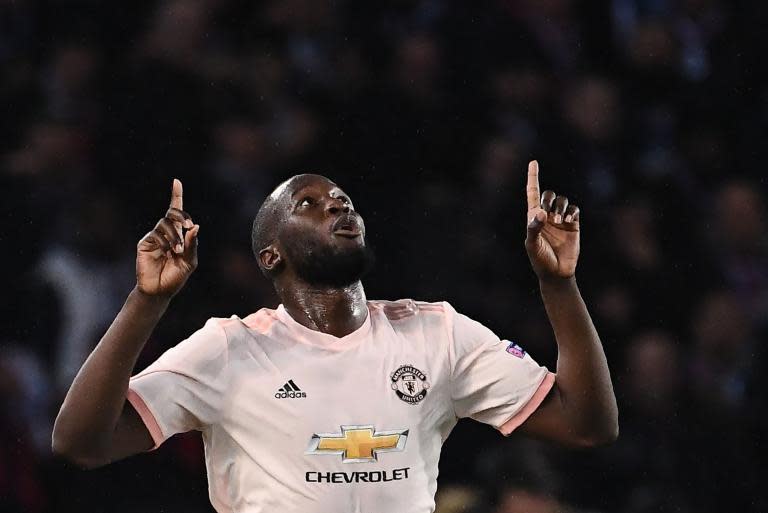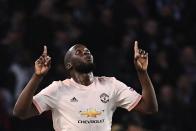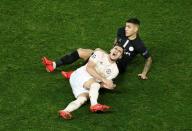PSG vs Manchester United: Five things we learned as Marcus Rashford's late VAR penalty sends United through
Paris Saint-Germain were eliminated by Manchester United as the Red Devils mounted a historic comeback in the Champions League at the Parc des Princes.
Ole Gunnar Solskjaer's side gave the Parisians a scare, scoring inside two minutes through Romelu Lukaku, before PSG asserted themselves and got level.
But Lukaku's second left United needing just one goal to dump out the Ligue 1 champions on home soil.
An injury-riddled away side struggled to generate chances in the second half but Diogo Dalot's effort, which looked to have no chance of beating an admittedly below-par Gianluigi Buffon, cannoned into Presnel Kimpembe's arm and Marcus Rashford sent United through.
But what did we learn? Mark Critchley was there.....
United climb the mountain
“It’s never mission impossible,” Ole Gunnar Solskjaer insisted but even he surely did not see this coming. A remarkable game ended in extraordinary circumstances, with Manchester United scraping through the quarter-finals of the Champions League.
Paris Saint-Germain will look back on a first half where they dominated but errors allowed their opponents in. Romelu Lukaku profited, scoring two either side of Juan Bernat equaliser, but as a slower second half dragged on, Thomas Tuchel’s side looked like the only side capable of progressing.
But the VAR official Massimiliano Irrati saw something late on. The handball decision against Presnel Kimpembe was a touch harsh, perhaps. His back was turned. It brushed the side of his arm. Intentional? Maybe not.
But Marcus Rashford would dispatch the penalty and incredibly, send United through. Mission impossible accomplished. The ‘mountain’ their manager spoke of had been climbed. If it was not already Solskjaer’s job, it must be now.
Solskjaer’s surprise almost backfires

First Solskjaer’s teamsheet came with a surprise, then so did the way United actually lined up on the pitch. When Dalot was unexpectedly named on the substitutes’ bench and Bailly started ahead of him, it was assumed that United were playing three-at-the-back.
But Solskjaer had instead opted for a throwback to own days as a player in this competition - a traditional 4-4-2, a formation which normally requires physicality, pace and organisation in order to be a success.
United had none of that in the first half. A dominant PSG picked their way through gaping holes in midfield and defence, creating overloads in key areas and pinning the visitors inside their own half. United’s share of possession dropped as low as 13 per cent.
And yet, they went in at the break ahead, having scored a goal for every 25 completed passes. Solskjaer’s set-up had failed spectacularly according to each and every statistic except the one that counts most.
A more organised United emerged for the second half and ultimately progressed, thanks to Kimpembe’s fatal handball.
Bailly’s night to forget
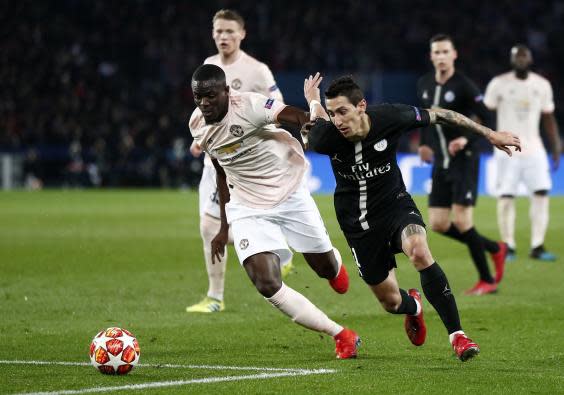
There are performances which fall so far below the basic standards that they elicit more sympathy than criticism. Those performances come around rarely but Eric Bailly had one here, with an unorthodox take on the concept of playing right-back.
Bailly is not a natural in the role. Anyone who witnessed him allow Juan Bernat and Angel di Maria the freedom of the entire flank in the opening half hour could have told you that. But that does not excuse his string of basic errors.
Already the victim of one unforced first-half substitution this season, against Newcastle United under Jose Mourinho, Bailly was sacrificed early once again with Dalot brought on in his place after 36 minutes.
He limped as he walked off, suggesting that perhaps an injury was at the root of his poor performance. But a strained muscle does not stop you from staying concentrated and from carrying basic positional play.
It was ultimately a night that Bailly will want and need to forget quickly.
PSG fail to see it out
The question hanging over PSG ahead of this second leg was whether they could cope with the psychological pressure of having a lead to hold. Memories of the remontada have not faded and the importance of the Champions League to the Qatari project has only increased.
The early signs were not good. There was Thilo Kehrer’s under-hit back pass which led to Lukaku’s first. For the same goal, there was Gianluigi Buffon’s rashness in coming too quickly off his line and his calamitous spill for Lukaku’s second.
Even Kylian Mbappé was not quite firing on all cylinders, with poor touches leading him to easily lose control of the ball. The showboating of Dani Alves at 1-1 was needless and eventually punished too.
And ultimately, they could not see it. Dalot’s late shot was the only one a more composed PSG conceded in the second half, but Presnel Kimpembe’s stray arm meant it led to the decisive penalty. So close to seeing it out, they failed.
Lukaku at the double again
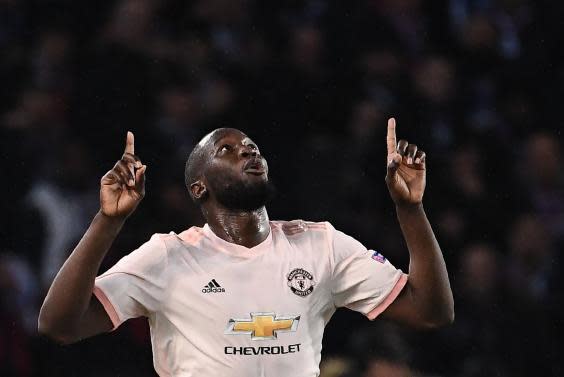
It could easily be forgotten on such a dramatic night, but the gradual return to form of Romelu Lukaku is at one additional positive which Solskjaer and United can take from the evening.
After braces against Crystal Palace and Southampton in the past seven days, his two here meant he became the first United player to score twice in three consecutive games since Cristiano Ronaldo.
And that despite not appearing to fit into Solskjaer’s first-choice starting line-up when all options are available. It remains unclear how exactly Lukaku can be best used if Rashford is Solskjaer’s undisputed No 9.
But over the past week, he has demonstrated that he has too much to offer to be dismissed. United need options. They have a £75million signing capable of both playing off the shoulder of the last defender and winning physical battles. It would be unwise to sideline him entirely.

 Yahoo Sport
Yahoo Sport 






































